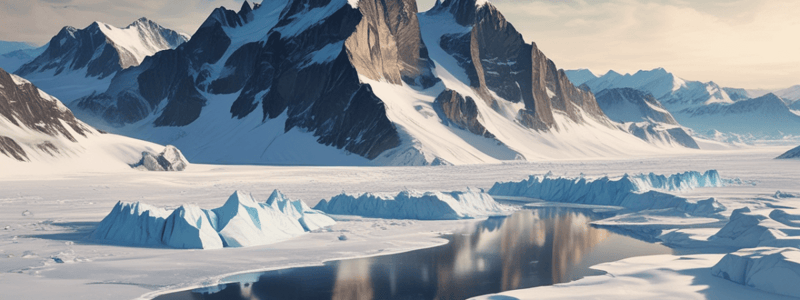Podcast
Questions and Answers
What percentage of the Earth's surface is covered by glaciers today?
What percentage of the Earth's surface is covered by glaciers today?
- 20%
- 5%
- 10% (correct)
- 30%
How much of the planet's freshwater is contained in glaciers?
How much of the planet's freshwater is contained in glaciers?
- 50%
- 70% (correct)
- 60%
- 80%
What is the primary mechanism by which glaciers create landforms such as hills and ridges?
What is the primary mechanism by which glaciers create landforms such as hills and ridges?
- Deposition (correct)
- Tectonic plate movement
- Erosion
- Glacial melting
What is the term for the process by which glaciers pick up and carry rocks and sediments?
What is the term for the process by which glaciers pick up and carry rocks and sediments?
What is the primary reason for the formation of lakes and valleys by glaciers?
What is the primary reason for the formation of lakes and valleys by glaciers?
What is formed when the compacted sediments left behind by two glaciers are pushed upwards?
What is formed when the compacted sediments left behind by two glaciers are pushed upwards?
What is the term for the long, snakelike ridges of till formed by subglacial streams?
What is the term for the long, snakelike ridges of till formed by subglacial streams?
What was the primary mechanism for the formation of the five Great Lakes in North America?
What was the primary mechanism for the formation of the five Great Lakes in North America?
What is the term for the unsorted sediment deposited by glaciers?
What is the term for the unsorted sediment deposited by glaciers?
What happened to the ice blocks left behind by the glaciers during the final retreat of the glaciers at the end of the last Ice Age?
What happened to the ice blocks left behind by the glaciers during the final retreat of the glaciers at the end of the last Ice Age?
What is the term for the mixture of unsorted sediments deposited by a glacier?
What is the term for the mixture of unsorted sediments deposited by a glacier?
What type of moraine is formed at the farthest point reached by a glacier?
What type of moraine is formed at the farthest point reached by a glacier?
What are rocks and soils carried atop the glacier referred to as?
What are rocks and soils carried atop the glacier referred to as?
What is the term for large boulders or stones carried from one location to another by the glacier and deposited along its path?
What is the term for large boulders or stones carried from one location to another by the glacier and deposited along its path?
What is the term for the backward movement of a glacier away from its farthest point of advance?
What is the term for the backward movement of a glacier away from its farthest point of advance?
Flashcards are hidden until you start studying
Study Notes
Glaciers and Glacial Deposits
- Glaciers are large masses of ice that form when snow is compacted over time, covering nearly 10% of the Earth's surface and containing almost 70% of the planet's freshwater.
- During the last Ice Age, large parts of North America, Europe, and Asia were covered by ice, sometimes over 2 miles deep.
- As the glaciers retreated, many landforms were created, such as the basins of the five Great Lakes, the hills comprising parts of Boston, and the horns and arêtes of Glacier National Park.
Glacial Deposition
- Glacial deposits refer to the sediments left behind by a moving glacier.
- As glaciers move, they pick up and drag along rocks and sediment, causing further erosion and deposition of sediments along the edges of the glacier as it retreats or moves backward.
Depositional Features of Glaciers
- Glacial till, also known as glacial drift, is a mixture of unsorted sediments deposited by a glacier, with two main types: basal till (carried in the base of the glacier) and ablation till (left behind as the glacier melts).
- Moraines are mounds or ridges of glacial till formed along the edges of glaciers, with two types: lateral moraines (deposited along the sides of the glacier) and terminal moraines (deposited at the farthest point reached by a glacier).
- Layers of glacial sediment can form as the glacier moves and melts, including proglacial sediment, ice-marginal sediment, subglacial sediment, and superglacial sediment.
Other Types of Glacial Deposits
- Erratics, or dropstones, are large boulders or stones carried from one location to another by the glacier and deposited along the glacier's path.
- Drumlin is a long ridge of glacial till that can form hills, such as in the city of Boston.
- Sandur or outwash plain refers to thick layers of sediments deposited in front of the glacier as it retreats.
- Glacial retreat can lead to the formation of kettle lakes, arêtes, eskers, and other features.
Glacial Retreat and Landforms
- Kettle lakes are small circular bodies of water formed when blocks of ice left behind by the glacier melt.
- Arêtes are tall, narrow crests formed by the compacted sediments left behind by two glaciers.
- Eskers are long, snakelike ridges of till formed by subglacial streams.
- The five Great Lakes in North America were formed by glacial retreat, with the basins eroded by the ice and later filled with meltwater.
Studying That Suits You
Use AI to generate personalized quizzes and flashcards to suit your learning preferences.



